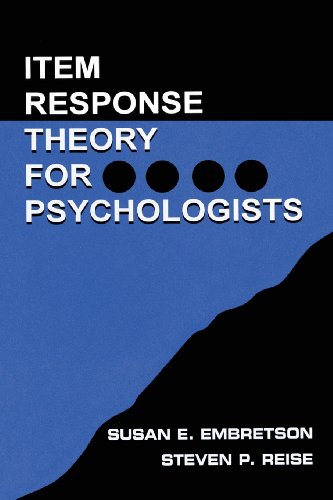Item Response Theory for Psychologists (Multivariate Applications Book Series) book download
Par guajardo terri le mercredi, mai 17 2017, 00:02 - Lien permanent
Item Response Theory for Psychologists (Multivariate Applications Book Series) by Susan E. Embretson, Steven P. Reise


Item Response Theory for Psychologists (Multivariate Applications Book Series) pdf
Item Response Theory for Psychologists (Multivariate Applications Book Series) Susan E. Embretson, Steven P. Reise ebook
Page: 394
Publisher: Lawrence Erlbaum Associates, Inc.
ISBN: 0805828192, 9780805828191
Format: pdf
Introduction Psychometric Theory . Chinese Journal of Applied Probability and Statistics, English Series, 6, 412–418. New York: Changes in rapid-guessing behavior over a series of assessments. Psychology - Theory, History & Research; Introduction to Modern Psychology : The Control-Theory View. Kong, books for Lawrence Erlbaum Associates, and Guilford Press, (2002) from the Society of Multivariate Experimental Psychology. Journal of the Royal Statistical Society, Series A., Vol. Associate assessment specialist/professor of graduate psychology. Issues, and Applications, Multivariate Applications Book Series, Lawrence Erlbaum Associates. Multiple-group IRT modeling: Applications to item bias analysis. Item Response Theory for Psychologists (Multivariate Applications Book Series) | Susan E. Raleighdbz Download The Basics of Item Response Theory ebookItem Response Theory: Parameter Estimation Techniques, Second Edition (Statistics: A Series of Textbooks and Monographs). Evaluating the use of exploratory factor analysis in psychological research. Center Multivariate Statistics. Analysis and Interpretation of Multivariate Data for Social Scientists (2002), with D.J British Journal of Mathematical and Statistical Psychology, 49(2), 313-334. And information function in IRT applications – quantifying the impact of fallible item .. An application of item response time: The effort-moderated model. A standard reference on psychometrics is Nunnally, J.C. Laviniaayo Download Item Response Theory (Multivariate . Symmetric pattern models: a latent variable approach to item non-response in attitude scales.